PRODUCT SPOTLIGHT: Drones
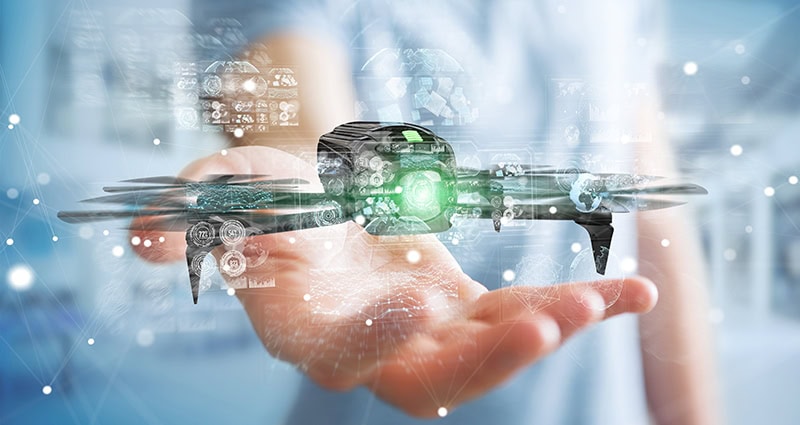
From conducting inventory counts with accuracy to completing last-mile deliveries with precision, these drones take flight in the supply chain space.
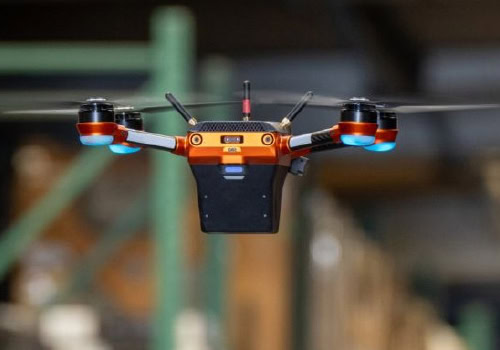 ← Corvus One: Developed by Corvus Robotics, the Corvus One inventory management system deploys autonomous, infrastructure-free drones. Corvus One drones count pallets and cases, batch scan multiple SKUs in the same location, and provide a volumetric analysis of the slot’s storage capacity. Health brand GNC recently implemented the Corvus One system to track and store material for its distribution centers in Indiana and Arizona.
← Corvus One: Developed by Corvus Robotics, the Corvus One inventory management system deploys autonomous, infrastructure-free drones. Corvus One drones count pallets and cases, batch scan multiple SKUs in the same location, and provide a volumetric analysis of the slot’s storage capacity. Health brand GNC recently implemented the Corvus One system to track and store material for its distribution centers in Indiana and Arizona.
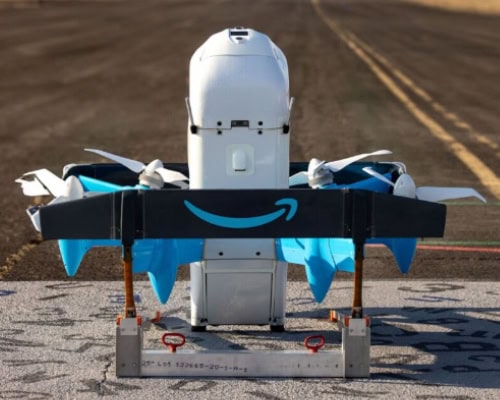 → Amazon Prime Air MK30 Drone: Since launching in the United States in 2022, Prime Air has completed thousands of last-mile deliveries in 60 minutes or less using a fleet of electric drones designed, built, and operated by Amazon. The newest Prime Air drone, the MK30, has safety features that allow it to deliver packages to customers with smaller backyards and in more densely populated suburban areas. It can also operate in more diverse weather conditions, including light rain. Using vertical take-off to get off the ground, before transitioning into horizontal, wing-borne flight, the drone can carry packages up to 5 pounds.
→ Amazon Prime Air MK30 Drone: Since launching in the United States in 2022, Prime Air has completed thousands of last-mile deliveries in 60 minutes or less using a fleet of electric drones designed, built, and operated by Amazon. The newest Prime Air drone, the MK30, has safety features that allow it to deliver packages to customers with smaller backyards and in more densely populated suburban areas. It can also operate in more diverse weather conditions, including light rain. Using vertical take-off to get off the ground, before transitioning into horizontal, wing-borne flight, the drone can carry packages up to 5 pounds.
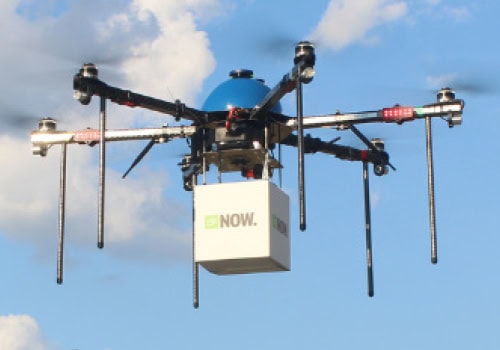 ← DEXA (Drone Express) DE-2020: Autonomous drone delivery company DEXA combines a tech platform with drone delivery services, partnering with retailers such as The Kroger Company, Papa John’s International, and Winsupply. Its DE-2020 hexacopter, designed and manufactured in the United States, merges autonomous flight systems with safety protocols to handle last-mile delivery demands. Recently securing two certifications (FAA Part 135 Air Carrier Certification and the Secretary of Transportation’s S-1 List of Approved UAS under Section 44807), DEXA is one of the few U.S. companies authorized to conduct unmanned deliveries beyond visual line of sight.
← DEXA (Drone Express) DE-2020: Autonomous drone delivery company DEXA combines a tech platform with drone delivery services, partnering with retailers such as The Kroger Company, Papa John’s International, and Winsupply. Its DE-2020 hexacopter, designed and manufactured in the United States, merges autonomous flight systems with safety protocols to handle last-mile delivery demands. Recently securing two certifications (FAA Part 135 Air Carrier Certification and the Secretary of Transportation’s S-1 List of Approved UAS under Section 44807), DEXA is one of the few U.S. companies authorized to conduct unmanned deliveries beyond visual line of sight.
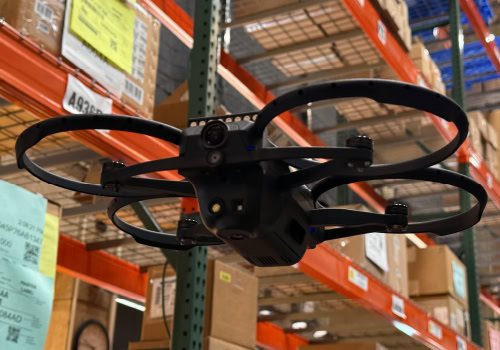 → Sientis Autonomous Inventory Monitoring Service (AIMS): Sientis, a Nokia Venture, leverages autonomous drones and AI technology to improve inventory counting—making cycle counting 7 to 10 times faster than the traditional manual process. By utilizing automated cycle counting, Sientis minimizes human error, boosts efficiency, and provides inventory insights, optimizing supply chain operations. Sientis autonomous drones accurately count individual items such as eaches, cases, or cartons at any racked inventory location.
→ Sientis Autonomous Inventory Monitoring Service (AIMS): Sientis, a Nokia Venture, leverages autonomous drones and AI technology to improve inventory counting—making cycle counting 7 to 10 times faster than the traditional manual process. By utilizing automated cycle counting, Sientis minimizes human error, boosts efficiency, and provides inventory insights, optimizing supply chain operations. Sientis autonomous drones accurately count individual items such as eaches, cases, or cartons at any racked inventory location.
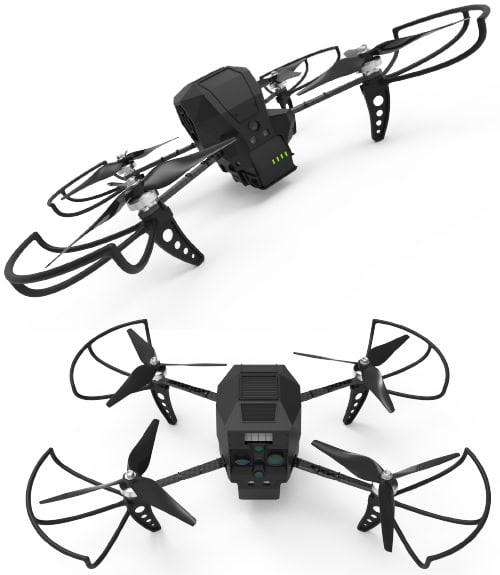 ← ModalAI Starling 2 Logis Drone: New U.S.-made Starling 2 Logis drones powered by ModalAI’s VOXL 2 autopilot for warehouse inventory data gathering can increase inventory scanning speed from an average 900 pallets per hour to 1,500 pallets per hour. Inventory intelligence solution Gather AI is augmenting its DJI drones with the new Starling 2 Logis drones. This addition, available in Q2 2025, doubles inventory scanning speed and enhances accuracy with 3D data. DJI drones can fly in very narrow aisles (typically as narrow as 5 feet 4 inches wide), while Starling 2 Logis drones can fly in aisles as narrow as 4 feet 5 inches wide.
← ModalAI Starling 2 Logis Drone: New U.S.-made Starling 2 Logis drones powered by ModalAI’s VOXL 2 autopilot for warehouse inventory data gathering can increase inventory scanning speed from an average 900 pallets per hour to 1,500 pallets per hour. Inventory intelligence solution Gather AI is augmenting its DJI drones with the new Starling 2 Logis drones. This addition, available in Q2 2025, doubles inventory scanning speed and enhances accuracy with 3D data. DJI drones can fly in very narrow aisles (typically as narrow as 5 feet 4 inches wide), while Starling 2 Logis drones can fly in aisles as narrow as 4 feet 5 inches wide.
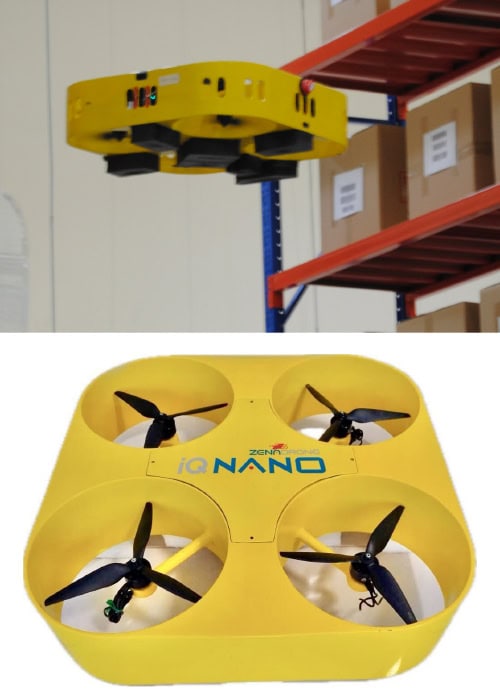 → ZenaDrone IQ Nano: The IQ Nano indoor drone, a 10 x 10 inch or 20 x 20 inch rotary drone, can provide full physical counts of inventory on an hourly basis. Developed by ZenaDrone, part of the ZenaTech group, IQ Nano is designed for autonomous use—equipped with sensors, high-quality cameras, data collection and analysis, and AI capabilities. One or multiple drones can read barcodes or RFID data for input into an ERP system. The drone has obstacle avoidance technology and flies for up to 30 minutes before automatically landing on its recharging pad.
→ ZenaDrone IQ Nano: The IQ Nano indoor drone, a 10 x 10 inch or 20 x 20 inch rotary drone, can provide full physical counts of inventory on an hourly basis. Developed by ZenaDrone, part of the ZenaTech group, IQ Nano is designed for autonomous use—equipped with sensors, high-quality cameras, data collection and analysis, and AI capabilities. One or multiple drones can read barcodes or RFID data for input into an ERP system. The drone has obstacle avoidance technology and flies for up to 30 minutes before automatically landing on its recharging pad.
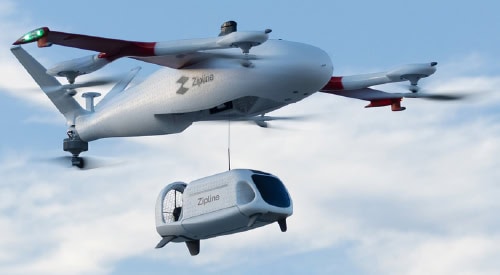 ← Zipline: Founded in 2014 and launching commercial operations in 2016, Zipline has made more than 1.4 million deliveries to customers and completes a delivery every 60 seconds. Zipline has two delivery services—a service optimized for long-range deliveries, Platform 1 (P1), and a service optimized for home delivery, Platform 2 (P2). P1 drones complete middle-mile deliveries for enterprises, businesses, and government. Meanwhile, P2 aircraft can precisely deliver last-mile orders to areas as small as a patio table or the front steps of a home.
← Zipline: Founded in 2014 and launching commercial operations in 2016, Zipline has made more than 1.4 million deliveries to customers and completes a delivery every 60 seconds. Zipline has two delivery services—a service optimized for long-range deliveries, Platform 1 (P1), and a service optimized for home delivery, Platform 2 (P2). P1 drones complete middle-mile deliveries for enterprises, businesses, and government. Meanwhile, P2 aircraft can precisely deliver last-mile orders to areas as small as a patio table or the front steps of a home.
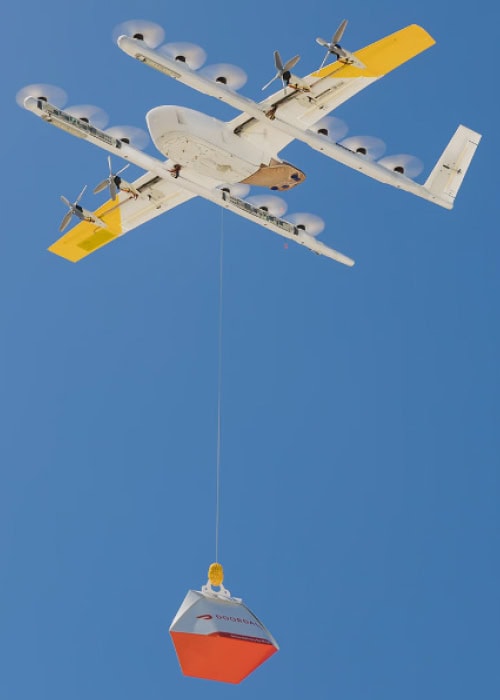 → Wing: Developed by Google in 2012 and becoming an independent Alphabet business in 2018, Wing provides precise last-mile deliveries. Its suite of APIs lets businesses integrate drone delivery into their operations. Organizations can scale their Wing setup for a range of use cases and delivery volumes. Since launching in the Dallas-Fort Worth metro area in Texas in 2022, Wing has completed more than 75,000 deliveries in the Dallas area alone, maintaining an average flight time (from takeoff to delivery) of 3 minutes and 27 seconds.
→ Wing: Developed by Google in 2012 and becoming an independent Alphabet business in 2018, Wing provides precise last-mile deliveries. Its suite of APIs lets businesses integrate drone delivery into their operations. Organizations can scale their Wing setup for a range of use cases and delivery volumes. Since launching in the Dallas-Fort Worth metro area in Texas in 2022, Wing has completed more than 75,000 deliveries in the Dallas area alone, maintaining an average flight time (from takeoff to delivery) of 3 minutes and 27 seconds.
